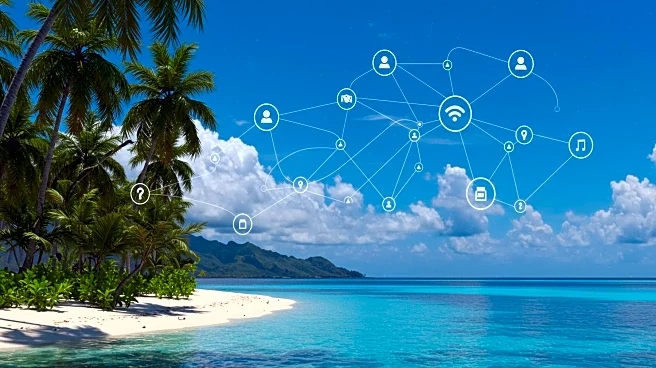What's Happening?
A recent report by the United Nations Educational, Scientific and Cultural Organization (UNESCO) has revealed significant progress in Fiji's internet development, achieving a 97% penetration rate among its population of 940,000. The report, titled 'Assessing Internet Development in Fiji,' covers findings from a comprehensive assessment conducted between September 2023 and September 2024. Despite the high penetration rate, the report identifies several challenges, including uneven distribution of internet services, particularly in remote areas, and a lack of mechanisms to ensure web accessibility for persons with disabilities and rural communities. Additionally, Fiji has not yet established a national Internet Governance Forum (IGF) or formal frameworks for multistakeholder participation in internet-related policymaking, which are crucial for fostering engagement and transparency.
Why It's Important?
The findings of the UNESCO report are significant as they highlight both the achievements and the ongoing challenges in Fiji's internet infrastructure. The high penetration rate indicates substantial progress in digital connectivity, which is essential for economic growth and social development. However, the identified gaps in accessibility and stakeholder engagement could hinder Fiji's aspirations to become a 'smart island.' Addressing these issues is crucial for ensuring equitable access to digital resources and fostering inclusive policymaking. The introduction of low-earth orbit satellites presents an opportunity to improve connectivity in remote areas, but without robust legal frameworks and public consultation mechanisms, the benefits may not be fully realized.
What's Next?
To address the challenges outlined in the report, Fiji may need to prioritize the development of legal and practical frameworks for public consultation and multistakeholder engagement. Establishing a national IGF could facilitate broader participation from government, civil society, the private sector, and academia in shaping internet policies. Additionally, expanding infrastructure to improve connectivity in remote areas and ensuring web accessibility for all citizens, including those with disabilities, will be critical steps in achieving comprehensive digital inclusion.
Beyond the Headlines
The report's findings underscore the importance of inclusive digital policies that consider the needs of all community segments. The lack of multistakeholder participation in internet policymaking could lead to decisions that do not fully reflect the diverse interests and needs of Fiji's population. Furthermore, the emphasis on accessibility highlights ethical considerations in ensuring that technological advancements benefit everyone, particularly marginalized groups.










